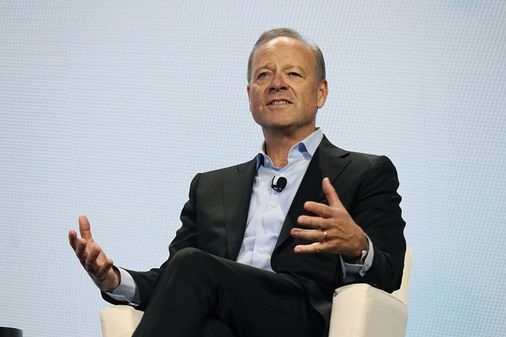Biogen CEO calls new Alzheimer’s drug first breach of disease’s Leave a comment
Three days after an influential advisory panel recommended expanded US approval of a new Alzheimer’s drug, the top executive of Biogen ― which co-developed the treatment ― called its clinical findings “the first breach in this fortress wall” that’s long thwarted attempts to find therapies for the disease.
Chris Viehbacher, chief executive of Cambridge-based Biogen, speaking Monday at the World Medical Innovation Forum in Boston, also called for broad insurance coverage of the treatment, Leqembi, and defended the $26,500 annual price of the drug set by Biogen and its Japanese partner Eisai.
Viehbacher, interviewed in a fireside chat with CNN medical correspondent Meg Tirrell, said he “struggles with” pricing drugs, but believes industry critics don’t fully appreciate the expense and risk inherent in drug discovery — and the decades of failures in attempts to treat the memory-robbing disease.
It “is certainly a high price when you look at where median income is,” he told hundreds of business and medical leaders gathered at the Westin Boston Seaport Hotel for the forum, sponsored by the Mass General Brigham health system. “But these two companies [Biogen and Esai] have literally spent billions of dollars just on the clinical development costs … and let’s not forget [investments in] the 10 drugs that also failed along the way.
“It’s hard to do innovation, and also have low [drug] prices,” Viehbacher said.
Pushback against the price of Leqembi, which won conditional “accelerated approval” from the Food and Drug Administration in January, is already coming from Capitol Hill. In a letter to US Health and Human Services Secretary Xavier Becerra earlier this month, US Senator Bernie Sanders, the Vermont Independent who chairs the Senate Health Committee, called it “an outrageously high price” that will deter many seniors from seeking treatment.
Sanders called for suspending Leqembi’s patents, which grant the drug’s mechanism a temporary monopoly, unless the drug makers lower the price.
Last Friday, an independent advisory committee voted 6-0 to recommend that the FDA grant full approval to the medicine, which slowed the rate of clinical decline by 27 percent in a pivotal clinical trial compared with a placebo. FDA officials, though not required to follow the panel’s recommendation, are widely expected to grant the Alzheimer’s drug full approval by July 6.
As long as the drug is cleared only through the accelerated approval pathway, Medicare, the federal agency that insures Americans older than 65, has departed from its usual practice by agreeing only to pay for Leqembi — and other Alzheimer’s drugs that similarly work by clearing sticky clumps of beta amyloid from the brains of patients — for those taking part in clinical trials.
If it wins full approval next month, Medicare officials have said they will reimburse all patients so long as they’re listed in a registry compiled by doctors who prescribe the Alzheimer’s medicine. Viehbacher said Biogen and Eisai are still awaiting details as to how the registry will work.
“Hopefully, the medicine is approved, and the registry is not too onerous,” he said. “We want to make sure the burden on patients is not higher.”
Biogen and Eisai will have to work with doctors and hospitals across the United States to create procedures for diagnosing early-stage Alzheimer’s patients who can benefit from Leqembi through PET scans or lumbar punctures, Viehbacher said, and set up a network of centers to administer the drugs intravenously.
Viehbacher called the emergence of new Alzheimer’s treatments from Biogen and Eisai ― along with a rival drug candidate by Eli Lilly that also showed clinical benefits in a late stage study ― one of the few times in his 35-year career where “you’ve got something completely brand new where nothing has existed.”
Alzheimer’s has thrown up “this big wall of a fortress,” Viehbacher said. “And we’ve been hitting this with rocks and cannon balls and everything else and made no progress. And this [Leqembi] clinical trial is the first breach in this fortress wall. And now … there’s going to be a lot more research done.”
Robert Weisman can be reached at robert.weisman@globe.com.



